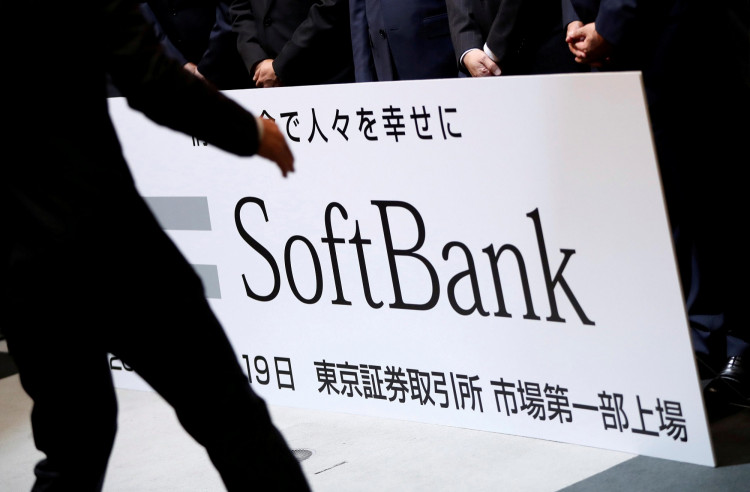On Thursday, SoftBank's stock closed at 11,190 yen, hitting a historic high and surpassing its previous peak of 11,000 yen set on February 15, 2000.
Analysts attributed this significant rise to SoftBank's successful bets on the AI industry and its investment in Arm, leading to a strong recovery in its stock price following the internet bubble of 2000 and the tech stock crash of 2021-2022.
UBS Bets on AI and Arm Success
Founded in 1981 by Masayoshi Son, SoftBank's journey began with software distribution. The company successfully listed in Japan in 1994. During the internet boom, SoftBank invested $2 million in Yahoo in the mid-1990s, marking its entry into tech investments.
With the internet's rapid growth, SoftBank's stock hit a closing high of 10,111.1 yen on February 18, 2000, after setting an intraday record of 11,000 yen three days earlier. However, the bursting of the internet bubble saw SoftBank's stock plummet by over 90%.
In 2017, Masayoshi Son launched the massive Vision Fund, initiating an upward trend in SoftBank's stock, albeit with volatility. The Vision Fund invested globally in numerous tech companies, with mixed results. For example, WeWork, once valued at $47 billion in a SoftBank-led funding round in 2019, failed to go public and filed for bankruptcy.
After nearly 21 years, SoftBank finally surpassed its historical closing high on February 16, 2021. However, the subsequent global tech stock crash severely impacted its stock, and SoftBank was not spared. In 2022, the Vision Fund reported its highest-ever loss, prompting Son to adopt a more conservative investment strategy, entering what he called a "defensive" mode.
Despite a record $32 billion loss in the Vision Fund in 2023, Son quickly pivoted, announcing a shift to an "offensive" strategy, doubling down on AI investments. From May 2023, as tech stocks broadly recovered, SoftBank's stock began to rise, and the Vision Fund's financials improved.
Oliver Matthew, Head of Asia Consumer Research at CLSA, stated in an email to CNBC, "Softbank Vision Fund had to write down various investments due to a combination of equity values declining and a tougher private financing environment. It looks like the write down cycle is mostly done, and there is a good chance that the IPO market will be more constructive going forward, especially for AI related investments"
In 2023, SoftBank's stock surged about 78%, largely attributed to the successful IPO of Arm and Son's winning bets in AI.
Paul Golding, an analyst at Macquarie's U.S. equity research division, noted that SoftBank has long invested in building an AI ecosystem, a vision that may have partly driven its acquisition of Arm in 2016. Golding believed that SoftBank's early investments in the AI ecosystem and its acquisition of Arm provided critical market positioning and intellectual property in the semiconductor industry.
Golding added that SoftBank's stock benefited from Arm's technology being applied across various industries, such as the automotive sector and cloud data centers, garnering increased attention and recognition.
Is SoftBank's Stock Overvalued?
SoftBank's strategic investments, particularly its stake in Arm, have prompted investors to question whether SoftBank's market value accurately reflects the value of its holdings.
SoftBank's market capitalization stands at approximately $101.5 billion, while its 90% stake in Arm is worth around $158 billion, based on Arm's near 124% stock rise this year to a market cap of about $176 billion as of July 3. This valuation excludes other SoftBank assets and business units, such as its telecommunications operations.
Dan Baker, a senior equity analyst at Morningstar, pointed out that much of SoftBank's stock appreciation is indeed due to Arm's performance.
In an email to the media, Baker said, "While this year's stock price increase is primarily driven by Arm's rise and the yen's depreciation, I'm not sure if investors are entirely convinced by SoftBank's overall story." He suggested using a sum-of-the-parts (SOTP) valuation method to assess SoftBank's various segments accurately. According to him, this year's SOTP valuation still trails by nearly 50%, indicating that SoftBank's stock price does not fully reflect the value of its businesses and investments.
Baker concluded, "So I'm not sure that investors are 'buying the SoftBank story' but investors are certainly buying the ARM story."
SoftBank may also benefit from the broader rise in the Japanese stock market, with the Nikkei 225 Index up 22% this year as of Thursday.
Matthew from CLSA highlighted that SoftBank's early investments in AI could reduce its valuation discount in the future. Matthew stated, "Softbank has been absolutely consistent about its investment direction; they were among the earliest investors behind the AI theme, and in some ways too early so many investors thought they were overpaying, or buying into certain companies where it wasn't clear how AI was related."





